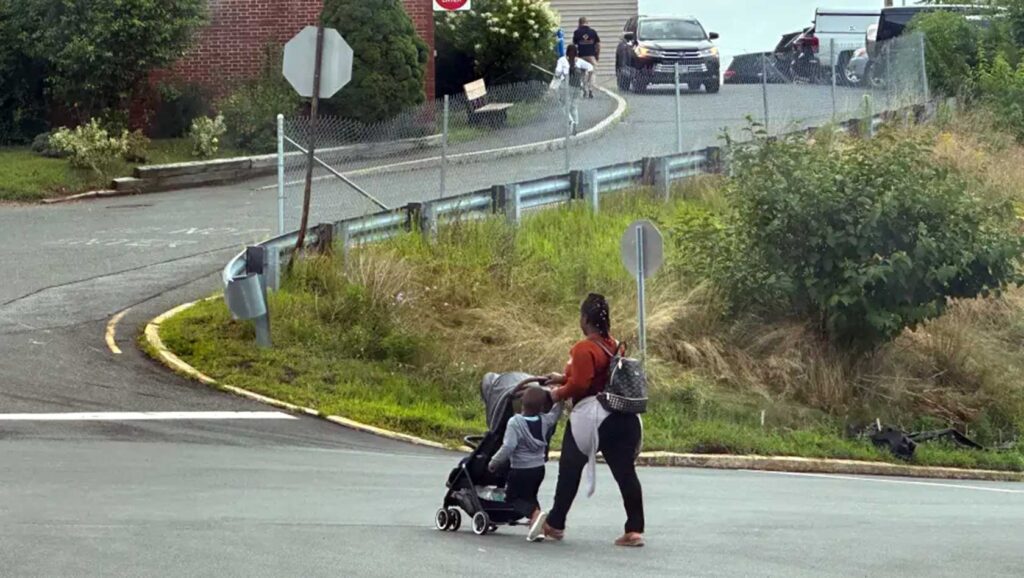Family shelter system will undergo massive changes, including phaseout of hotels

The strained family shelter system is getting drastic changes from the Healey administration as migrant families continue to seek humanitarian relief in Massachusetts.
The systemwide changes, announced Friday, are intended to help lower costs, phase out the use of hotels as shelters, reduce the number of shelter units, and refocus resources. Some changes will go into effect on December 10.
“The current system, the way it’s operating, also needs to shift and change to make it more fiscally affordable and operationally sustainable,” said Lieutenant Governor Kim Driscoll in an interview. “The goal of the announcement that we’re making today is sort of this next evolution where we will work to lower cost by phasing out the use of motels and getting families on a pathway to more independence.”
Families will be directed to two systems: either the Rapid Shelter Track, or Bridge Shelter Track. The Rapid Shelter track is “expected to conclude in 30 days” and the Bridge Shelter Track, “no longer than six months.”
The length of stay at what is currently a temporary respite center will change from five days to 30 days. For longer-term shelter, now dubbed “bridge shelter,” that will go down from nine months to six months but require legislative approval.
“These changes will allow families to stay at TRCs longer — with some allowance for extensions,” said the Healey administration in a press release. The change comes as a response from providers who have long protested the docking down to five days with extensions.
Driscoll gave an example. “You come in on May 7th and you’re not starting your new lease until July 1st. Like, of course, we’re going to work with you to keep you housed while you’re there. So there is some opportunity for what we call hardship waivers,” she said.
Families diverted to rapid shelter will be those who have more resources and are able to more rapidly find permanent housing, with help from HomeBASE, and they will continue to get referrals for work authorizations, job placements and English classes. HomeBASE is a program of the Massachusetts Executive Office of Housing and Livable Communities.
Bridge Tracking will be for more high-risk families with complex needs, including women who have late-term pregnancies and people with developmental disabilities. Families will not be able to choose their own tracks.
For example, if the parents are able to work, they will be better suited for the Rapid Shelter Track because having a job and paycheck will help them move into stable housing. If a family has complex needs, like a long eviction history or barriers to work, they may need more support to find permanent housing and will be placed in the Bridge Shelter Track. The changes apply to all emergency shelter residents and those incoming migrants, 65% of which are Massachusetts residents.
The administration will phase out the usage of hotels and motels because they are more expensive. Families will be notified in advance of closures. Providers will support families with exiting to stable housing.
The administration is hoping to boost its HomeBASE program with funds for temporary rental subsidies. Under these changes, families will be eligible for up to $25,000 of rental assistance per year for two years. The current benefit is a total of $30,000 over two or $45,000 over three years. This is subject to legislative approval.
The adjustments come as a result of the recommendations of a special commission tasked with assessing the pitfalls of the current emergency assistance program, and providing recommendations.
“In order to prevent our shelter system from seizing, the Healey-Driscoll administration has worked tirelessly to implement practical changes. We must bring down costs and refine how the Commonwealth meets the needs and delivers services in order to continue sheltering families,” said Danielle Ferrier, CEO, Heading Home, a shelter provider. She said the administration the state has worked to balance sheltering families and staying ahead of a system “overloaded of demand.”
The state is also continuing with the closing of the family welcome center at Eastern Nazarene College in Quincy and will be relocating it to Hancock Street in Quincy. High-risk families will be supported at a site in Revere. The Cambridge Temporary Respite Center will close by December 15, and those families are currently being moved. The Immigrant Family Services Institute has also started offering Family Welcome Center services in a Mattapan location.
The state said without efforts to limit families in the system over the summer, emergency shelters were projected to reach 13,000 families by June 2024 and would be even larger today. Instead, the system has remained steady around 7,500 families, the cap imposed by the administration.
Up to 40 families continue to seek shelter daily with the average around 15 to 18 families. The state says approximately 65 percent of families coming into the system the past few weeks have been Massachusetts residents. The current overall system is split about 50-50, half migrant families, and half Massachusetts residents.
The state says it has helped more than 3,800 families exit shelter in the past year. In addition to exits, more than 700 families have been diverted from state shelters in the past year, according to the state.
Sarah Betancourt is a bilingual reporter for GBH News, and longtime Boston muckraker.






